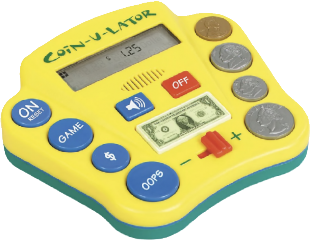FINANCIAL PLANNING
INDEPENDENCE
FINANCIAL LITERACY FOR STUDENTS WITH DISABILITIES
BY LAUREN AGORATUS, M.A.
Financial literacy is key for students with disabilities to develop independence. Four key issues to address are defining financial literacy skills, the importance of starting early, the family's role, and how assistive technology (AT) can help with independence in transitioning to adult life.
WHAT ARE FINANCIAL LITERACY SKILLS?
Students with disabilities need to understand the concepts of earning, budgeting, and borrowing. For earning, they need to understand their pay and benefits. Students will learn to make the most of what they bring in whether it is earned income such as wages and salary or unearned income from programs like SSI (supplemental security income), SNAP (supplemental nutrition assistance program, aka food stamps), etc.
Regarding saving and budgeting, students with disabilities need to have an understanding of what saving is and how to invest money. Budgeting is the most important tool for controlling finances. Students need to plan for spending and saving and spending less than they make. Some ideas for budgeting include making a separate line for saving in the budget, putting away $1 a day, saving in a jar, etc. While spending, students with disabilities need to understand the value of an item they want to purchase. They also need to know the various ways to pay such as cash, check, debit/credit, or electronically. Automatic deductions for rent, utilities, phone etc. may be helpful. Students should also know how to get good value for something by comparing prices.

ON THE MONEY: Students can learn about money with this interactive coin-counting calculator. The Coin-U-Lator can count money, teach the value of different coins, determine how much money is needed to make a purchase, and more.
For borrowing, students with disabilities need an understanding how to borrow and the pros and cons of loans and credit cards. They need to realize if they don't have enough money, they can pay later but sometimes this comes with interest so they end up paying even more. Families can use supported decision-making to help with this (see Resources).
IMPORTANCE OF STARTING FINANCIAL LITERACY INSTRUCTION EARLY
Developing financial capability is an important part of transition. The U.S. Treasury defines this as the ability "to manage financial resources effectively" and this applies to everyone, including students with disabilities. Lessons in school must be age appropriate and should be individualized by the goals and objectives in the IEP (Individualized Education Program) during transition.
WHAT IS THE FAMILY'S ROLE?
Children with disabilities should be involved in family discussions on finances to the best of their ability. Families can talk about earning, saving, and borrowing. Another important discussion is how to protect your money and identity, such as using a bank account for a paycheck. Families can also discuss benefits such as SSI to help students understand supports available to them if needed.
HOW ASSISTIVE TECHNOLOGY CAN AID IN INDEPENDENCE IN ADULT LIFE
It is important to note that the need for Assistive Technology (AT), including AT that can help with financial literacy, must be considered in the IEP/504 process. Per IDEA (Individuals with considered in the IEP/504 process. Per IDEA (Individuals with Disabilities Education Act), AT is used to "increase, maintain, or improve functional capabilities". There are two considerations regarding AT in the educational process: the actual devices and services, and training in their use.
Financial literacy is one of the key components necessary for successful transition of students with disabilities to adult life. Specific concepts in developing these skills include earnings (both earned and unearned income), saving and budgeting, and understanding borrowing. This must be started early by both families and schools. Assistive technology tools can help facilitate this process. Everyone, but especially students with special needs, can benefit from developing financial literacy skills.
Note: This article is based on SPAN's (SPAN Parent Advocacy Network) Developing Independence webinar series; Special thanks to Dawn Monaco of SPAN for her help.•
ABOUT THE AUTHOR:
Lauren Agoratus, M.A. is the parent of a young adult with multiple disabilities. She serves as the State Coordinator for Family Voices-NJ and as the central/southern coordinator in her state's Family-to-Family Health Information Center. FVNJ and F2FHIC are both housed at the SPAN Parent Advocacy Network (SPAN) at spanadvocacy.org
MAKING CENTS : MONEY SKILLS AND BUDGETING RESOURCES
MONEY SKILLS: BASICS
DOLLARS AND CENTS APP apps.apple.com/us/app/dollars-cents-lite/id738508003
COUNTING BILLS AND COINS APP apps.apple.com/us/app/counting-bills-coins/id374976971
COINULATOR Money calculator with dollars/cents proedinc.com/Products/20180/coinulator.aspx
BUDGETING
VISA FINANCIAL FOOTBALL APP apps.apple.com/us/app/visa-financial-football/id1419550251
DAILY BUDGET APP SUPPORTED DECISION-MAKING supporteddecisionmaking.org apps.apple.com/us/app/daily-budget-original/id651896614
MINT APP apps.apple.com/us/app/mint-personal-finance-money/id300238550
WALLY APP apps.apple.com/us/app/wally-smart-personal-finance/id1178011327
PRO ED MATH proedinc.com/Products/20341/money-math-super-store.aspx
MONEY SKILLS: PAYING FOR ITEMS
SEEING AI APP apps.apple.com/us/app/seeing-ai/id999062298
CALCULATOR APP apps.apple.com/us/app/the-calculator/id398129933
MONEY CALCULATOR play.google.com/store/apps/details?id=org.spicydog.coincounter&hl=en_US
CENTS AND SENSIBILITY studymoney.us/#/Home
SUPPORTED DECISION-MAKING supporteddecisionmaking.org
NATIONAL TECHNICAL ASSISTANCE CENTER ON TRANSITION Financial Literacy for Students with Disabilities Annotated Bibliography transitionta.org/sites/default/files/Annotated_Bibliography_Financial_Literacy_KClark.pdf
SPAN webinar youtube.com/watch?v=EzV77vBehCc&feature=youtu.be